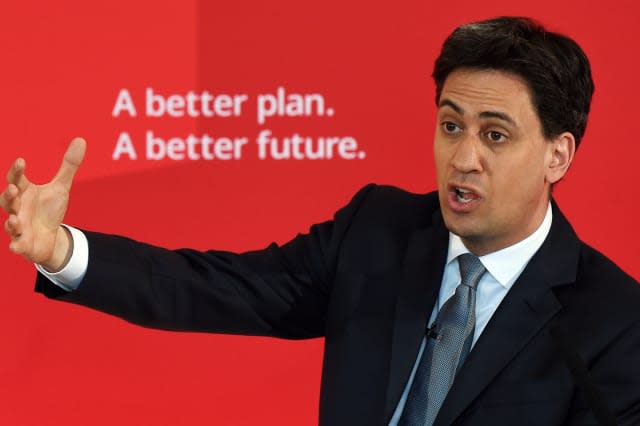Labour 'the party of UK security'

In a bold bid to claim traditional Conservative territory in the General Election battle, Ed Miliband will claim that Labour is now the party best placed to maintain the security of the UK, because of Tory plans for cuts which would 'undermine' the armed forces
In a speech to foreign policy think-tank Chatham House, the Labour leader will accuse David Cameron of pursuing a foreign policy of 'small-minded isolationism' that has put party interest first and led to the 'biggest loss of influence for our country in a generation'.
<p class="p2">Citing figures from the independent Institute for Fiscal Studies suggesting that government departments including the Ministry of Defence would face deep cuts as part of Conservative deficit-reduction plans, Mr Miliband will say Tories are set on 'an ideological project to cut the size of the state' which would harm the security of the country.
'I want to be absolutely clear that amongst the reasons we reject the extreme spending cuts that the Conservative Party propose is that they would be truly catastrophic for the future of our armed forces,' Mr Miliband will say.
'The IFS set out yesterday that they would mean at least 18% budget reductions for departments like the Ministry of Defence - significantly more than the cuts it has had over the course of the last Parliament. Conservative assurances to protect specific parts of the defence budget are meaningless in that world; they simply will not be delivered, they will be broken promises.
'Extreme approach'
'Labour simply will not take the extreme approach our opponents propose. I am not going to sacrifice the defence and security of our country on an ideological commitment to a significantly smaller state.
'Indeed, we are now in an unprecedented situation going into this election. It is now the Labour Party which is much better positioned to find the resources in the next parliament that our armed forces need to maintain the security of the United Kingdom and play our part in maintaining the security of the world.'
The Labour leader will also lay part of the blame for the flood of refugees making perilous Mediterranean crossings at the door of the Prime Minister, saying Britain should have done more to plan for the aftermath of the fall of Muammar Gaddafi in Libya.
But, in the wide-ranging speech, he will also attempt to put some of his own party's ghosts to rest by insisting that he has learned the lessons of the Iraq war.
Mr Miliband will set out the terms for military action under a Labour government and highlight the threats Britain is facing internationally, including from Islamic State, also known as Isil.
In stark contrast to the Conservative promise of an in/out referendum on Britain's membership of the European Union, Mr Miliband will say he 'will never put our national interest at risk by threatening to leave'.
Mr Miliband will say that Britain has 'more authority when we work' with global allies and will pledge to strengthen the UK's position in international institutions such as the United Nations, Nato, the Commonwealth and the European Union.
'Biggest loss of influence'
The Labour leader will accuse David Cameron of presiding over the 'biggest loss of influence for our country in a generation', with the government he led 'sidelined in crucial international events time after time'.
'It is time to reject the small-minded isolationism that has characterised this government, diminished the office of prime minister and shrunk the influence of Britain,' he will say.
'Because this government's approach has and weakened Britain at a time when the challenges are perhaps greater and more complex than at any time since the Second World War.'
The threat from failed states and those stricken by civil war across the Middle East is 'spilling over' into Europe through terrorism, illegal immigration and organised crime, he will say.
'The challenge posed by Isil's barbarism is the most pressing case,' Mr Miliband will say.
'It was right that the UK joined other nations in air strikes against Isil targets in Iraq. But military action alone will not defeat Isil. A long-term multinational political strategy, with regional actors playing a central role, is essential for tackling the rise of extremism across the region and at home.
'And as we do so we must also learn the lessons of previous interventions. These are the vital lessons of our recent past and I will not forget them. Legitimate interventions must be supported by international, regional and local players, carried out with a clearly defined strategy, as well as include a comprehensive transition and post-conflict strategy.'
Migrant deaths
Mr Miliband will say Britain should have done more to plan for the aftermath of the fall of the Gaddafi regime in Libya, saying: 'Since the action, the failure of post-conflict planning has become obvious. David Cameron was wrong to assume that Libya's political culture and institutions could be left to evolve and transform on their own.

'The tragedy is that this could have been anticipated. It should have been avoided. And Britain could have played its part in ensuring the international community stood by the people of Libya in practice rather than standing behind the unfounded hopes of potential progress only in principle.'
Environment Secretary Liz Truss said it was 'absolutely offensive' for the Labour leader to lay blame at the Prime Minister's door.
She added: 'To bring this into an election campaign I think is outrageous and disgraceful.
'Actually accusing the Prime Minister of causing these deaths - whether directly or indirectly - I think is wrong.'
Asked on BBC Radio 4's Today programme if Mr Miliband should withdraw the suggestion, she replied: 'I absolutely think he should withdraw it.'
She went on: 'Ed Miliband feels like he's losing the argument and he's lashing out.
'Of course we should be talking about foreign affairs but it has to be done in a proper manner.'
'Manufactured row'
Shadow foreign secretary Douglas Alexander accused the Conservatives of manufacturing a row.
He told BBC Radio 4's Today programme: 'The speech rightly highlights the loss of British influence that David Cameron has overseen.'
He said the Prime Minister had "abjectly failed" to engage in effective post-conflict planning.
'I do think David Cameron waded in and then walked away,' he went on.
'It is a failure of post-conflict planning for which the international community bears responsibility.
'That's not a matter of dispute. It's simply a matter of fact.'
Mr Alexander, who is Labour's election strategy chairman, was asked what he would do if he found himself as foreign secretary in a couple of weeks' time.
He insisted he would not lift the arms embargo, but would look at freezing assets of the groups operating in Libya.


